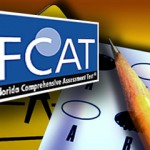A Parent’s Guide To How New Common Core Tests Are Different From FCAT
By now, most Florida parents have heard the Florida Comprehensive Assessment Test is on its way out. But they might not know a whole lot about what’s replacing the FCAT.
The most likely replacement is known as PARCC, or the Partnership for the Assessment of Readiness for College and Careers. Students are scheduled to begin taking the test in the spring of 2015 (more on that later).
We’ve put together a handy video that lays out the differences between the two exams.
A Parent’s Guide To How New Common Core Tests Are Different From FCAT from StateImpact Florida on Vimeo.
Here are some of the key differences:
- The test is designed to be taken online. It’s one reason why school will need to upgrade their Internet bandwidth and add computers or tablets over the next few years.
- The test is more interactive. Questions are more like puzzles, often asking students solve a series of interrelated problems or perform a task. Often, students will need to type in answers.
- Fewer multiple choice questions. Many of the questions are open-ended and students will be less likely to guess the correct answer.
- Same task, multiple ways. The new exam often asks students to perform similar tasks multiple ways to make sure they understand the concept. For instance, elementary students might be asked to convert 3/4ths to another, equivalent fraction and then place both on a number line.
Another set of differences between PARCC and FCAT revolve around when and how often the two tests are given. FCAT exams in each subject are given only once a year.
- Students will take PARCC exams twice during the school year.
- The first time is about three-quarters of the way through the school year — February, or so. That test will require students to perform task and type out answers and will be graded by human scorers.
- The test will be two days of English Language Arts and one day of math.
- The second round of testing will be one day each of English Language Arts and math, coming about 90 percent of the way through the school year. Those exams will be objective right-or-wrong answers which will be graded by computer.
- The test scores are cumulative. In total, PARCC will increase the time students spend testing each year.
- Students in 11th grade will be required to take the new exam.
- There are two optional PARCC exams being designed. One would be given at the beginning of the year and the other halfway through the year.
Florida schools are changing tests as part of the switch to new education standards, known as Common Core.
The standards provide a framework for what students should know at each grade level in math and English language arts courses. The standards also will require students to support their claims using evidence from their lessons.
Experts say the standards are tougher and ask more of students.
What else is different?
Some of Florida’s current tests will remain. Here’s a chart to show which tests will go and which will stay:
[spreadsheet key=”0Av06TaO9jXYrdEJ5Tlh6MzVvMWlUaHJUQTVfX0dCbWc” source=”Florida Department of Education” filter=0 paginate=0 sortable=0]
There are still questions about when Florida students will begin taking the new test, and which test they will take.
Though Florida will most likely choose PARCC, Education Commissioner Tony Bennett said the state will consider all its options. Bennett said he also wants the option of a paper and pencil test at first.
Lawmakers have also proposed a bill that would delay the use of new exams until schools have the proper technology and Internet bandwidth in place to administer the exam.
Have more questions about Common Core standards or the new test? Send them our way and we’ll answer them in future posts. Email us at florida@stateimpact.org and put “Core Questions” in the subject line.
Correction: We’ve updated the chart to correct when students must take Florida’s Civics course.

